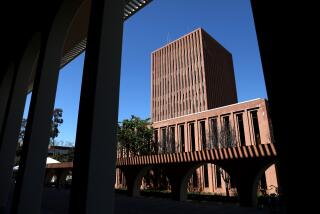Computer Marketing Plans Fail to Make Grade : United Education Returns to Its True Vocation
- Share via
Aaron Cohen learned a lesson last year that isn’t taught in his trade schools: It’s tough for a small company to make it to the big leagues.
Cohen, president and chief executive of Encino-based United Education & Software, tried to transform his company from a small operator of private trade and technical schools in Southern California into a major nationwide marketer of computer software and personal computers.
The idea fizzled, however. A glut in the personal computer market hurt the company and helped produce a loss of nearly $3 million in the fiscal year ended Jan. 31. It made a profit of $790,000 the year before.
A few weeks of witnessing dismal results and a string of sleepless nights persuaded Cohen to halt his ambitious expansion plans. “If this company had continued along, it would be out of business by now,” he said.
Alive and Well
Today, however, United Education & Software is alive and well. The company turned a profit in its first two quarters this year, mainly because it sharply scaled down its computer-equipment business and once again focused on career schools.
In its second quarter ended July 30, the company showed a $183,000 profit on revenue of $5.1 million, an improvement from the $800,000 loss on revenue of $4.7 million it had in the same period a year earlier.
Cohen has resumed building United Education’s chain of 12 schools in Los Angeles, Orange and San Diego counties. The company has 11 schools that use the Pacific Coast name--Pacific Coast College or Pacific Coast Technical Institute --and one known as Sawyer College in San Diego.
Two weeks ago, United Education disclosed plans to acquire its 13th school, National Technical Schools in South-Central Los Angeles, for an undisclosed sum in a transaction that it hopes to complete by November. The 80-year-old, employee-owned school offers correspondence courses and classes in automobile mechanics, electronics and computer repairs. The acquisition would add about 500 students to the 8,000 now enrolled in United Education’s schools.
Vocational Skills
United Education’s students typically pay from $2,000 to $7,000 to study fields such as nursing, bookkeeping, court reporting, computer operations, welding and automobile repair.
The company stumbled into the schools business. Cohen, a UCLA Engineering School graduate, and partner Jack Lin formed Associated Engineering Test Laboratories near Inglewood in 1961 to provide engineering testing services for aerospace companies. The business was bought by Whittaker Corp. in 1968, and was sold back to Cohen and Lin in 1973 as National Technical Services, later renamed National Technical Systems.
The firm had evolved into a business that primarily inspected high-rise buildings to make sure they met construction specifications. Cohen and Lin thought that the company needed a supply of trained welders, so they bought two welding schools, in Downey and Anaheim.
They discovered there was money to be made in schools. Shortly after the acquisitions, National Technical formed an education group--which eventually became United Education & Software--and began buying trade schools.
Stock Sale
In 1982, 39% of United Education & Software’s stock was sold publicly, with National Technical keeping the rest of the shares. Lin, president and chief executive of National Technical Systems, still owns nearly 7% of United Education’s stock and serves as chairman, although he is not involved in the company’s daily operations.
The company grew rapidly in the early 1980s--from $3.9 million in revenue in its 1981 fiscal year to $14.1 million in 1984. Despite that growth, Cohen early last year thought that the company had to quickly increase its revenue to the $25-million range to get the kind of bank credit it needed and to meet the targets it had set when its stock was sold to the public.
United Education & Software wanted to use Spectrum, a Sioux Falls, S.D.-based computer firm it bought in 1983 and renamed Data Systems Group, to try to produce that growth. Cohen’s computer programmers already had spent more than $1 million to develop computer software to help run the vocational schools, software that he felt could be sold to other schools by Data Systems. As an additional moneymaker, the software was to be sold in a package along with computer equipment, mostly personal computers made by IBM and Texas Instruments.
The company spent more than $1 million to buy 300 IBM personal computers and related equipment last year. But, by the time the personal computers were delivered in July, 1984, the computer market already was glutted and the price cutting had started. “We could buy the computers cheaper from a store down the street than we could from IBM,” Vice President R. Nelson Carnes said.
Computer Sales Fall
Instead of selling 300 to 400 of the personal computers a month at the healthy profit it expected, the company was selling fewer than 50, and those were sold at about the same price that the company paid for them. The revenue for its Data Systems’ unit, $4.6 million for the year, was less than half the $10 million that had been expected. For the year ended Jan. 31, the division lost $2.1 million.
At the same time, the vacancies in United Education’s classes were rising sharply, at least partly because the economy was improving.
United Education’s school business is counter-cyclical. In other words, unlike most companies, it suffers when a booming economy creates more jobs because fewer students enroll in job-training programs when work is available.
“There’s nothing like a good recession to get this company going like crazy,” said analyst Michael Adkins, an analyst for the Boston investment firm of Fechtor, Detwiler & Co.
Declining enrollment and the increased cost of recruiting students cut profits from the schools division by 56%, to $890,000 in the year ended Jan. 31, from $2 million a year earlier.
Bank Collapse Hurt
United Education also suffered in April, 1984, when West Coast Bank in Encino collapsed. One of United Education’s divisions helps banks handle paper work and collections for student loans under federally insured programs. West Coast Bank was doing $40,000 a month in business with United Education and owed the company $100,000 when it collapsed.
As the problems mounted, Cohen realized that he had to move quickly to save the company. “I didn’t have to see another month’s figures,” he said. “There were no more months.”
Cohen responded by cutting the national sales force, which cost more than $1 million a year in salaries and expenses, from 13 to one. Employment nationally was reduced from 450 people to about 380, although it now is back up to about 450.
In addition, the company sold its remaining IBM personal computers and now only sells equipment by special request. It also shortened the length of its courses to discourage students from dropping out early to take jobs.
Moves Praised
Analysts criticized United Education for plunging into the computer equipment business, but they praised it for moving quickly to cut its losses. “They didn’t make the right move at the right time, so they took the steps they had to take,” said Edward Comeau, an analyst with Laidlaw Adams & Peck in New York.
Although it still sells software, United Education executives have pretty much given up on becoming a fast-track, high-technology company. Although the trade schools business may not be as exciting, educators and analysts feel that demand for training programs will continue to be strong.
“Insofar as meeting the demand for entry-level positions, these schools can do it a lot faster and a lot cheaper than public schools,” said Wellford Wilms, associate professor in UCLA’s Graduate School of Education.
One of the few major worries facing the company is the possibility that the federal government will reduce its support for student loan programs. Nearly 90% of the students at United Education’s schools receive assistance through federally backed student loan programs.
Those loan programs are now under fire from critics who maintain that the government is spending too much to make good on loans when students default, especially students attending trade and technical schools. In California, the rate of default for graduates of those schools is 25%, or twice the statewide average for all schools, colleges and universities. Although Cohen and others in the industry are confident that the loan programs won’t be eliminated, some expect cutbacks.
More to Read
Inside the business of entertainment
The Wide Shot brings you news, analysis and insights on everything from streaming wars to production — and what it all means for the future.
You may occasionally receive promotional content from the Los Angeles Times.










